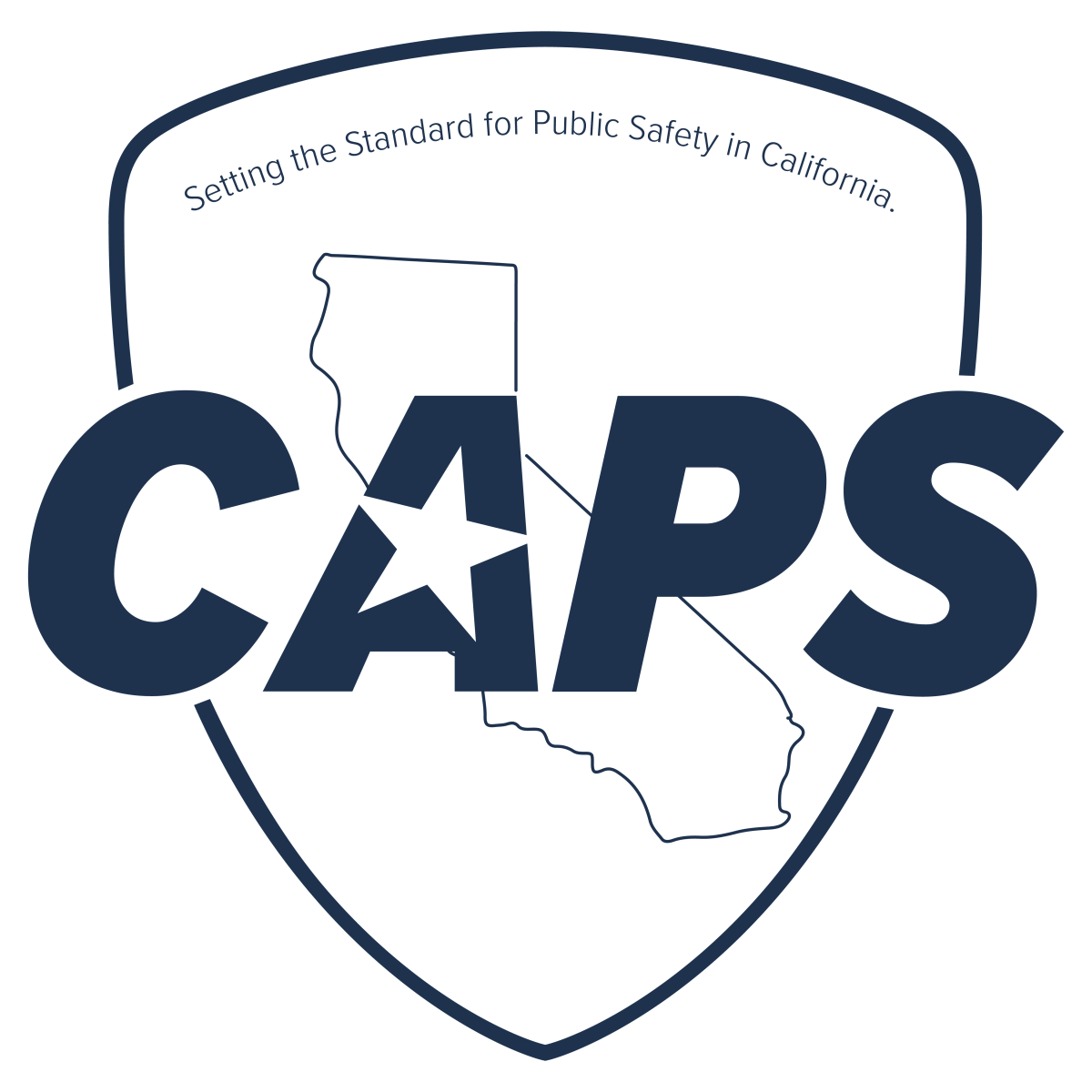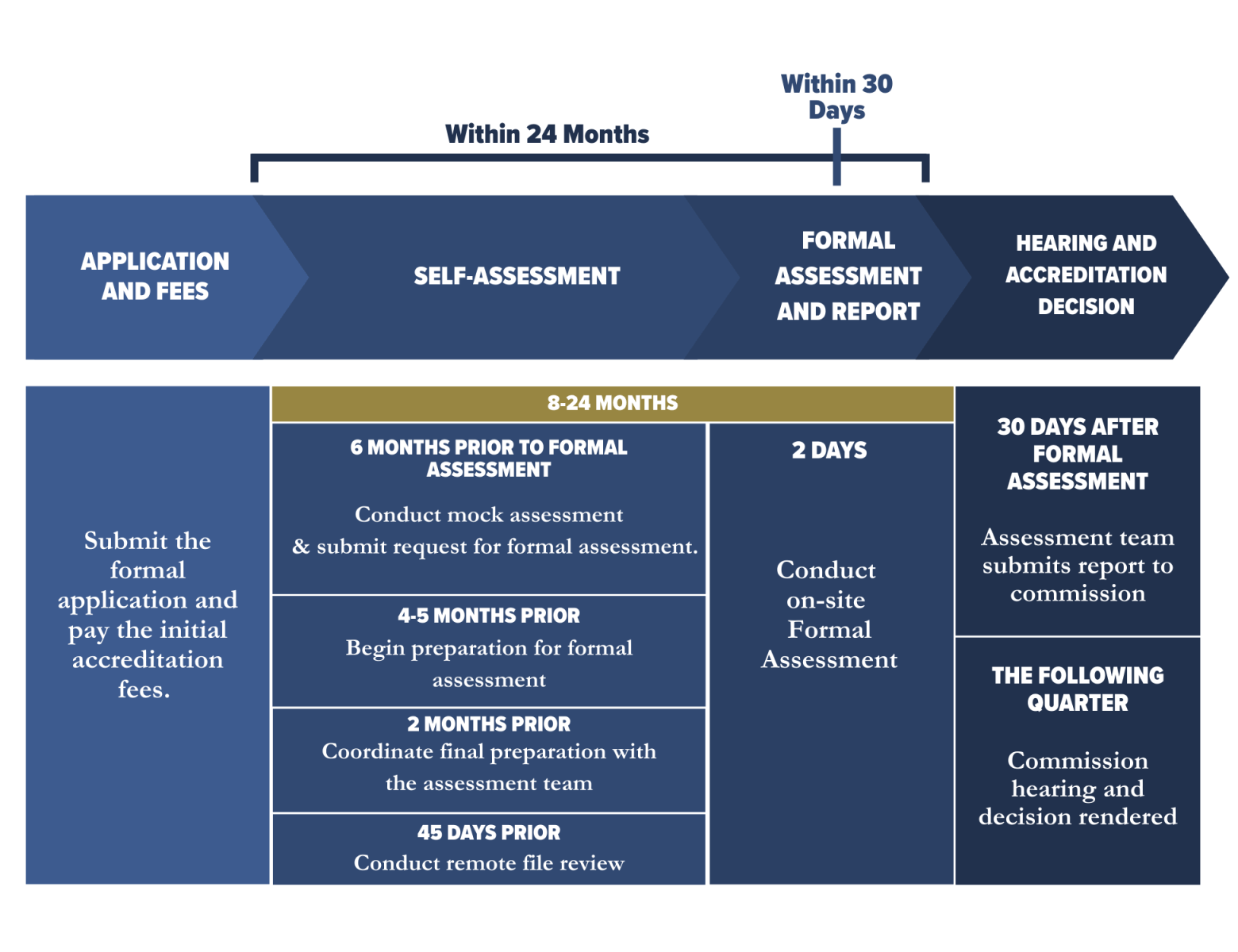How to Become Accredited Through CAPS
 Earning accreditation is a structured, transparent process that helps agencies align with best practices, strengthen community trust, and demonstrate a commitment to excellence. Below you’ll find the major phases of the program, each designed to provide clarity, support, and accountability.
Earning accreditation is a structured, transparent process that helps agencies align with best practices, strengthen community trust, and demonstrate a commitment to excellence. Below you’ll find the major phases of the program, each designed to provide clarity, support, and accountability.
CAPS will begin accepting applications in early 2026. Complete the CAPS Interest form to stay informed of updates as we near the Program launch!
More of a visual learner? Skip ahead to the process flowchart.
Accreditation steps at a glance:
- Prepare for Accreditation
- Application, Fees and Program Setup
- Self-Assessment
- Formal Assessment
- Commission Hearing & Accreditation Decision
1. Prepare for Accreditation
Accreditation requires commitment and coordinated effort. Agencies should ensure they are ready to begin the process before moving forward.
To prepare, agencies should:
- Research Accreditation and CAPS
- Create a Financial Plan
- Designate an Accreditation Manager (AM)
2. Application, Fees and Program Setup
Complete the Formal Application
The Formal Application marks the official registration of a law enforcement agency into the CAPS Accreditation Program. CAPS Staff will review all applications, and if accepted, the agency will be enrolled in the next enrollment cycle. At the start of the enrollment cycle, the agency formally enters the two-year initial self-assessment phase, a critical period of internal review and documentation.
Pay the Accreditation Fees
Accreditation through the CAPS Program requires payment of specific non-refundable fees that support the program's administration and sustainability. Once an agency’s application is accepted, an electronic invoice for enrollment fees will be sent to the agency. This enrollment fee must be paid in full before the start of the agency's enrollment cycle.
Notify Agency Staff and Assign Support Roles
Once an agency enters the CAPS accreditation process, it is important to inform staff and assign support roles early. Accreditation requires coordinated effort across leadership, supervisors, line personnel, and administrative staff. Early communication builds buy-in, clarifies responsibilities, and reinforces shared commitment.
Establish PowerDMS Access
Once enrolled with CAPS, agencies will work with PowerDMS to set up their account and begin the on-boarding process. PowerDMS charges an annual fee for software access.
3. Self-Assessment Phase
Agencies conduct a thorough internal review by comparing current policies and practices against accreditation standards. This phase includes:
-
Gap Analysis to identify areas for improvement.
-
Policy Development with access to model policies and templates.
-
Proof Collection to gather documentation and records demonstrating compliance.
-
Assessment Preparation through optional mock assessments and organizational planning.
4. Formal Assessment Phase
Once agencies are ready, a trained team of assessors is assigned to conduct the review. This phase includes both a remote file review and an on-site visit. The on-site visit typically spans two days and is designed to provide a comprehensive assessment of the agency’s operations and verify compliance with the accreditation standards. These activities include an entrance meeting, a facility tour, direct observations, staff and stakeholder interviews, and follow-up on any outstanding issues identified during the remote file review. Afterward, the team provides a detailed written report to the commission, outlining strengths, compliance, and any areas needing attention.
5. Commission Hearing and Decision
The Commission Review Hearing is a formal meeting, held either virtually or in person, where the agency presents its information and responds to questions from the Commission. Hearings are held quarterly and represent a key step in the accreditation decision making process, allowing the Commission to evaluate the agency’s compliance with required standards.
Following the hearing, the Commission deliberates and issues a final decision regarding the agency’s accreditation status.
More information on the Commission can be found here: Commission on Accreditation
Accreditation Timeline
6. Post-Accreditation Support
Accreditation is not a one-time achievement. Agencies receive continued support, including:
-
Annual compliance reporting.
-
Ongoing technical assistance from their liaison.
-
Access to updated training and standards.
-
Networking opportunities with other accredited agencies through forums and conferences.
7. Re-Accreditation Cycle
Accreditation is renewed on a 3-year cycle. During year three, agencies will undergo a mock assessment and formal assessment, followed by commission review, to confirm continued compliance and commitment to best practices.

